Occitania: Difference between revisions
ILoveCaracas (talk | contribs) |
ILoveCaracas (talk | contribs) |
||
| Line 196: | Line 196: | ||
But from 1881 onwards, children who spoke Occitan at school were punished in accordance with [[Political minister|minister]] [[Jules Ferry]]'s recommendations. That led to a deprecation of the language known as ''la [[vergonha]]'' (the shaming): the whole fourteen million inhabitants of the area spoke Occitan in 1914,<ref>Joseph Anglade, ''Grammaire de l'ancien provençal ou ancienne langue d'oc'', 1921: ''La Langue d'Oc est parlée actuellement par douze ou quatorze millions de Français'' ("Occitan is now spoken by twelve or fourteen million French citizens").</ref> but French gained the upper hand during the 20th century. The situation got worse with the media excluding the use of the langue d'oc. In spite of that decline, the Occitan language is still alive and gaining fresh impetus. |
But from 1881 onwards, children who spoke Occitan at school were punished in accordance with [[Political minister|minister]] [[Jules Ferry]]'s recommendations. That led to a deprecation of the language known as ''la [[vergonha]]'' (the shaming): the whole fourteen million inhabitants of the area spoke Occitan in 1914,<ref>Joseph Anglade, ''Grammaire de l'ancien provençal ou ancienne langue d'oc'', 1921: ''La Langue d'Oc est parlée actuellement par douze ou quatorze millions de Français'' ("Occitan is now spoken by twelve or fourteen million French citizens").</ref> but French gained the upper hand during the 20th century. The situation got worse with the media excluding the use of the langue d'oc. In spite of that decline, the Occitan language is still alive and gaining fresh impetus. |
||
<gallery mode="packed"> |
|||
Roman Empire with dioceses in 300 AD.png|thumb|left|{{legend|#E9AFAF|The Diocese of Vienne, 300 AC.}} |
|||
Aquitania Longnon 806.jpg|thumb|The [[Kingdom of Aquitaine]] after sharing 806 {{legend|#D6BE75|Kingdom of Aquitaine and its [Tribute|[Tributary countries]]}} |
|||
Cartes Occitanie.png|thumb|300px|left|Crown of Aragon and its ally the County of Toulouse, as well as their vassals in 1209. |
|||
Cathars expelled.JPG|thumb|The expulsion of the inhabitants of the city of Carcassona during the Albigensian Crusade (1209) |
|||
</gallery> |
|||
==Outer settlements== |
==Outer settlements== |
||
Revision as of 18:23, 29 December 2017
Occitania
Occitània | |
|---|---|
Region | |
![Gordes, a typical Provençal village, named by CNN as the most beautiful village of the world[1]](/media/wikipedia/commons/thumb/0/07/Gordes_Vaucluse_France_Luc_Viatour.JPG/250px-Gordes_Vaucluse_France_Luc_Viatour.JPG) | |
| Etymology: Oc (yes in Occitan)+"itania" from Aquitania | |
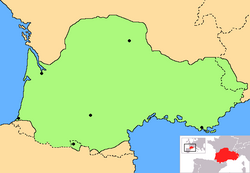 Linguistic map of Occitania | |
| Continent | Europe |
| Population | |
| • Total | 16 million |
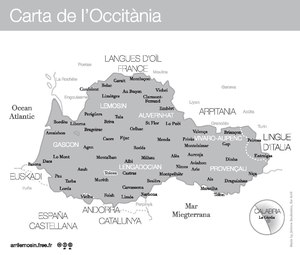
Occitania (Occitan: Occitània, IPA: [uksiˈtanjɔ], [ukʃiˈtanjɔ], [usiˈtanjɔ], [uksiˈtanja] or [utsiˈtanjɔ],[2][3] is the historical region in southern Europe where Occitan was historically the main language spoken,[4] and where it is sometimes still used, for the most part as a second language. This cultural area roughly encompasses the southern half of France, as well as part of Catalonia (Aran Valley), Monaco, and smaller parts of Italy (Occitan Valleys, Guardia Piemontese). Occitania has been recognized as a linguistic and cultural concept since the Middle Ages, but has never been a legal nor a political entity under this name, although the territory was united in Roman times as the Seven Provinces (Latin: Septem Provinciæ[5]) and in the early Middle Ages (Aquitanica or the Visigothic Kingdom of Toulouse,[6] or the share of Louis the Pious following Thionville divisio regnorumi in 806[7]).
Currently about 200,000–800,000[8][9] people out of 16 million living in the area are either native or proficient speakers of Occitan,[10] although the languages more usually spoken in the area are French, Catalan, Spanish and Italian . Since 2006, the Occitan language has been an official language of Catalonia, which includes the Aran Valley where Occitan gained official status in 1990.
Under Roman rule, most of Occitania was known as Aquitania,[11] the earlier conquered territories were known as Provincia Romana (see modern Provence), while the northern provinces of what is now France were called Gallia (Gaul). Under the Later Empire, both were grouped in the Seven Provinces, then Nine Provinces or Viennensis. So Provence and Gallia Aquitania (or Aquitanica) are the names used since medieval times for Occitania (i.e. Limousin, Auvergne, Languedoc and Gascony). Thus the historic Duchy of Aquitaine must not be confused with the modern French region called Aquitaine: this is the main reason why the term Occitania was revived in the mid-19th century. The names "Occitania"[12] and "Occitan language" (Occitana lingua) appeared in Latin texts from as early as 1242–1254[13] to 1290[14] and during the following years of the early 14th century; texts exist in which the area is referred to indirectly as "the country of the Occitan language" (Patria Linguae Occitanae). This derives from the name Lenga d'òc that was used in Italian (Lingua d'òc) by Dante in the late 13th century. The somewhat uncommon ending of the term Occitania is most probably a portmanteau French clerks coined from òc [ɔk] and Aquitània [ɑkiˈtanjɑ], thus blending the language and the land in just one concept.[15]
On 28 September 2016 Occitanie became the name of the administrative region that succeeded the regions of Midi-Pyrénées and Languedoc-Roussillon.[16]
Geographic extent


The extent of Occitania may vary according to the criteria used:
- Based on a geolinguistic definition, Occitania coincides with the current area of Occitan Occitan language[17][18]. The formerly Occitanophone regions are not included[19], on the other hand one always speaks Occitan in the French Basque Country[20][21] and in the Països Catalans (the Val d'Aran and the Fenolheda), and internal allophone enclaves (Petite Gavacharie of Poitevin-Saintongeais language, ancient Ligurianenclaves of eastern Provence, the quasi-Ligurian-Occitan enclave of Monaco ...); either taking into account the mass of lands where Occitan is spoken, without taking into account small internal or external enclaves[22]. This last definition of a contiguous and compact territory is currently the most widespread.
- Occitania was first defined in relation to its civilization, even before its language[23]. It gave rise in Europe to the troubadour movement, the idea of equality in human rights, racial and religious tolerance and a new culture of love which allowed the first moral and social promotion of women[23]. According to this definition taken up by historians and anthropologists[24], the domain is extended north to the Loire including former Occitanophone regions[25] (Aguiaine, Boischaut, Bourbonnais, etc.). The Northern Italy and the Països Catalans were also homes of troubadour using the Koiné Occitan literary. In the same way, the Basque Country and Aragon benefited from Occitan stands, old or newer, which notably gave rise to the appearance of a Occitan dialect south of the Pyrenees. We can also note the historical use of a Occitan scripta as official language[26][27][28].
The name Occitanie appeared in the Middle Ages on the basis of a geographical, linguistic and cultural concept, to designate the part of the French royal domain speaking the langue d’oc [29].
Its current definition is variable. In the most common usage, Occitania designates the territory where the Occitan has remained used until today[30][31][32], within the limits defined between 1876[33] and the 20th century[34]. If Occitan language and culture are almost always associated with it[30][31][32][35], we also find references to a common history[35][36], an ethnic group[35][36], a homeland[37][38], to a people[39][40][41][42][43] or to a nation[44][45][46][47]. The first sociological study in Occitan language to know how the Occitan define themselves was started in 1976[48]. The survey shows that the Occitan reality is defined by language for 95% of people, culture (94%), characterization by a common history (69%), an ethnic group (50%), a nation (20%) [35]. Occitania, as defined by the modern Occitan linguistic territory, covers most of the current Southern France, the Alpine valleys of the Western Piedmont, in Italy, Val d'Aran in Spain and Monaco[49][50] an area of approximately 190000 km2. It had about fifteen million inhabitants in 1999[51] with about 20% inhabitants born outside the territory [52] and about 20% of the natives who left[53]. On the other hand, in the absence of a linguistic census, we know only imperfectly the number of speakers of Occitan.[54]
If the preceding notions are generally limited to the modern linguistic boundaries of Occitan, this term can also be used to designate a larger territory. The term "Occitania" becomes commonplace more and more in the vocabulary of scientists [24]. It is used particularly in a historical sense and anthropological by designating a region extending north to the Loire, ignoring contemporary linguistic boundaries[25]. In a book written by experts in medieval history, are included in Occitania of the year 1000 both the provinces of the north (now mainly in Poitou-Charentes) and Catalonia (without the Balearic Islands and the Valencian country) - p. 484[55]. The seven-pointed star, adopted as emblem by the Felibritge symbolized the seven provinces of Occitania, one of which was Catalan[56]. Occitanie is indeed divided by this association into seven maintenances (sections) of which one was that of Catalonia-Roussillon.
In 2016, the name Occitanie is used for the French administrative region Languedoc-Roussillon-Midi-Pyrénées which is located on part of the traditional Occitania and includes the Roussillon.
Toponymies
Occitania comes from the medieval Latin Occitania. The first part of the name, Occ-, comes from Occitan òc and the expression langue d'oc, in Italian lingua d'oc. It is an appellation promoted by Dante Alighieri of Occitan by the way of saying "oui" in Old Occitan-Catalan; as opposed to the "langue de si" (Italian) and the "langue d'oïl" ("yes" in Old French). The ending -itania is probably an imitation of the name [Aqu] itania (Aquitaine). The term Occitania is a synonym for Languedoc and the Mediterranean coast in the Middle Ages.[57].
The first attestation of the use of Occitanie in French dates from 1556 [58][59][60]. The first certificate of Occitania in Italy date 1549 [61]. In German, we find the word Occitania in 1572.[62]
All of the Occitan language country have had various designations throughout history. The word Occitania has been the subject of whimsical etymologies, just like Languedoc formerly understood as "land of Goth" or "language of Goth"[63]) Alongside the rapprochement to the Occitan language retained today for the words Languedoc and Occitania. Thus, in La Minerve Française, a collective work published in Paris in 1818, we find a history of the changes of name of the provinces which makes the word Occitanie a doublet of the word Occident formed in the Lower Empire, giving it for origin the meaning of "western regions"[64] , and no region where we speak the Occitan language.
-
Testament of Lancelot of Orgemont, 1286.
-
Entry oucitanìo in The Treasure of Felibritge of Frederic Mistral
-
Pars occitana in a book printed in Latin in 1530.
Like the Occitan language, Occitania has been designated under various successive names [65]. The terms are not exclusive: one can, at the same time, find authors who use different terms. Occitania or Pays d'Oc are the most frequently used terms today. However the term Provence is still used when the Felibritgists sing the Copa Santa for example during the annual festival of Estello.
- Dioecesis Viennensis (Diocese de Vienne) et Dioecesis Septem Provinciarum (diocesis of the Seven provinces), under Diocletian and Constantine during a division of the Roman Empire, Gaul is divided into dioceses and that of Vienne has its border on the Loire river, bypasses the Central Massif and passes the Rhône between Lyon and Vienne[66]. This is the beginning of the bipartition between Occitan language and langue d'oil[67].
- Kingdom of Aquitaine: in 781, Charlemagne creates a new kingdom of Aquitaine and names his son Louis the Pious to his head. This new state included the Aquitaine properly speaking (region between Garonne and Loire and the central Massif) as well as the Vasconia. In 806, Charlemagne shares his empire. Louis the Pious receives in addition to Aquitaine the Marca Hispanica, Septimania and Provence.
- Proensa/Proença (old Occitan forms of Provence) and Prouvènço/Provença (Occitan modern forms of Provence), from the Latin Provincia which originally designated the Roman Province[68] is used from the 11th century: all countries of Occitan language (also called Provencal language) of the south of the Loire. The term Provence' is still used in its general sense by the felibritgists.
- Great Provence according to Palestra, Centenary of the Catalan Renaixença[69].
- Patria romana[70].
- Lingua Occitana (Occtan language) or Pars occitana (Part of oc) to designate the new royal territories conquered south of the Loire. Occitania was created in Latin by the Capetian administration with the combination of the particle 'Oc/òc' [ɔk] (yes, in Occitan) and of the 'Aquitania/Aquitània ' [ɑkitanjɑ] (Aquitaine)[71]. Appeared in the 13th century[72], this term served, after the annexation of almost all the countries of the South by France, to designate only the Languedoc.
- Respublica Occitania during the 14th century [73].
- Romania (Roumanío), in reference to the medieval usage of calling Occitan the roman[74].
- Homeland of the Occitan language (latin patria linguae occitanae), in the official texts of the Kingdom of France from the 14th century[68].
- Provinces of the Union or United Provinces of the South: in February 1573 the huguenots and the moderate Catholics create a federal republic where each province enjoys a great autonomy vis-a-vis the central power[75].
- Gascony after the Ordinance of Villers-Cotterêts, "the general name of Gascony or Gascons is used to refer to the countries and peoples to the left side of the Loire where still speaks the old Provençal"[76]. Used mainly from the access to the throne of France of Henri IV (1589) and until the French Revolution.[77]
- Reputed foreign provinces of the south of France since the middle of the 17th century at the end of the 18th century
- Occitania in the Diderot Encyclopedia.[78]
- Occitanie (in the sense of all the Occitan languages): in 1732 in the collection of Capetian laws of Shake Secousse,[79] in 1878, in the Treasure of the Felibritge, in 1911 in the Statutes of the Felibritge;[80] in 1927, Estieu and Salvat founded the College of Occitania.[81]
- Midi: is a vague geographical notion indicating in a rather imprecise way the regions of Occitan dialects of the Southern France.
- Southern France: is another vague geographical name indicating in a rather imprecise way the regions of Occitan dialects of the Southern France.
- Pays d'Oc: appeared in the 19th century under the impetus of Frederic Mistral,[82], taken over by Antonin Perbòsc four years later.
- Estate of Oc: neologism appeared at the end of the 20th century among supporters of several Occitan languages.
Geography


Occitania includes the following regions:
- The southern half of France: Provence, Drôme-Vivarais, Auvergne, Limousin, Guyenne, Gascony, southern Dauphiné and Languedoc. French is now the dominant language in this area, where Occitan is not recognized as an official language.
- The Occitan Valleys in the Italian Аlps, where the Occitan language received legal status in 1999. These are fourteen Piedmontese valleys in the provinces of Cuneo and Torino, as well as in scattered mountain communities of the Liguria region (province of Imperia), and, unexpectedly, in one community (Guardia Piemontese) in the region of Calabria (province of Cosenza).
- The Aran valley, in the Pyrenees, in Catalonia where Occitan has been an official language since 1990 (status granted by the partial autonomy of Aran Valley, then confirmed by the Catalan Statute)
- The Principality of Monaco (where Occitan is traditionally spoken beside Monégasque).
Occitan or langue d'oc (lenga d'òc) is a Latin-based Romance language in the same way as Spanish, Italian or French. There are six main regional varieties, with easy inter-comprehension among them: Provençal (including Niçard spoken in the vicinity of Nice), Vivaroalpenc, Auvernhat, Lemosin, Gascon (including Bearnés spoken in Béarn) and Lengadocian. All these varieties of the Occitan language are written and valid. Standard Occitan is a synthesis which respects soft regional adaptations. See also Northern Occitan and Southern Occitan.
Catalan is a language very similar to Occitan and there are quite strong historical and cultural links between Occitania and Catalonia.
History
This article's tone or style may not reflect the encyclopedic tone used on Wikipedia. (May 2012) |
Written texts in Occitan appeared in the 10th century: it was used at once in legal then literary, scientific or religious texts. The spoken dialects of Occitan are centuries older and appeared as soon as the 8th century, at least, revealed in toponyms or in Occitanized words left in Latin manuscripts, for instance.

Occitania was often politically united during the Early Middle Ages, under the Visigothic Kingdom and several Merovingian and Carolingian sovereigns. In Thionville, nine years before he died (805), Charlemagne vowed that his empire be partitioned into three autonomous territories according to nationalities and mother tongues: along with the Franco-German and Italian ones, was roughly what is now modern Occitania from the reunion of a broader Provence and Aquitaine.[83] But things did not go according to plan and at the division of the Frankish Empire (9th century), Occitania was split into different counties, duchies and kingdoms, bishops and abbots, self-governing communes of its walled cities. Since then the country was never politically united again, though Occitania was united by a common culture which used to cross easily the political, constantly moving boundaries. Occitania suffered a tangle of varying loyalties to nominal sovereigns: from the 9th to the 13th centuries, the dukes of Aquitaine, the counts of Foix, the counts of Toulouse and the Counts of Barcelona rivalled in their attempts at controlling the various pays of Occitania.
Occitan literature was glorious and flourishing at that time: in the 12th and 13th centuries, the troubadours invented courtly love (fin'amor) and the Lenga d'Òc spread throughout all European cultivated circles. Actually, the terms Lenga d'Òc, Occitan, and Occitania appeared at the end of the 13th century.
But from the 13th to the 17th centuries, the French kings gradually conquered Occitania, sometimes by war and slaughtering the population, sometimes by annexation with subtle political intrigue. From the end of the 15th century, the nobility and bourgeoisie started learning French while the people stuck to Occitan (this process began from the 13th century in two northernmost regions, northern Limousin and Bourbonnais). In 1539, Francis I issued the Ordinance of Villers-Cotterêts that imposed the use of French in administration. But despite measures such as this, a strong feeling of national identity against the French occupiers remained and Jean Racine wrote on a trip to Uzès in 1662: "What they call France here is the land beyond the Loire, which to them is a foreign country."[84]
In 1789, the revolutionary committees tried to re-establish the autonomy of the "Midi" regions: they used the Occitan language, but the Jacobin power neutralized them.
The 19th century witnessed a strong revival of the Occitan literature and the writer Frédéric Mistral was awarded the Nobel Prize in Literature in 1904.
But from 1881 onwards, children who spoke Occitan at school were punished in accordance with minister Jules Ferry's recommendations. That led to a deprecation of the language known as la vergonha (the shaming): the whole fourteen million inhabitants of the area spoke Occitan in 1914,[85] but French gained the upper hand during the 20th century. The situation got worse with the media excluding the use of the langue d'oc. In spite of that decline, the Occitan language is still alive and gaining fresh impetus.
-
The Diocese of Vienne, 300 AC.
-
The Kingdom of Aquitaine after sharing 806Kingdom of Aquitaine and its [Tribute
-
Crown of Aragon and its ally the County of Toulouse, as well as their vassals in 1209.
-
The expulsion of the inhabitants of the city of Carcassona during the Albigensian Crusade (1209)
Outer settlements

Although not really a colony in a modern sense, there was an enclave in the County of Tripoli. Raymond IV of Toulouse founded it in 1102 during the Crusades north of Jerusalem. Most people of this county came from Occitania and Italy and so the Occitan language was spoken.
Today

This section may need to be rewritten to comply with Wikipedia's quality standards. (October 2010) |
There are 14 to 16 million inhabitants in Occitania today. According to the 1999 census, there are 610,000 native speakers and another million people with some exposure to the language. Native speakers of Occitan are to be found mostly in the older generations. The Institut d'Estudis Occitans (IEO) has been modernizing the Occitan language since 1945, and the Conselh de la Lenga Occitana (CLO) since 1996. Nowadays Occitan is used in the most modern musical and literary styles such as rock 'n roll, folk rock (Lou Dalfin), rap (Fabulous Trobadors), reggae (Massilia Sound System) and heavy metal, detective stories or science-fiction. It is represented on the internet. Association schools (Calandretas) teach children in Occitan.
The Occitan political movement for self-government has existed since the beginning of the 20th century and particularly since post-war years (Partit Occitan, Partit de la Nacion Occitana, Anaram Au Patac, Iniciativa Per Occitània, Paratge, Bastir! etc.). The movement remains negligible in electoral and political terms. Nevertheless, Regional Elections in 2010 allowed the Partit Occitan to enter the Regional councils of Aquitaine, Auvergne, Midi-Pyrénées, and Provence-Alpes-Côte d'Azur.
Major demonstrations in Carcassonne (2005 and 2009) and Béziers (2007) and the week-long Estivada festivals in Rodez (2006–2010) suggest that there is a revival of Occitan language and culture. However, in France, Occitan is still not recognized as an official language, as the status of French has been constitutionally protected since 1992, and Occitan activists want the French government to adopt Occitan as the second official language for seven regions representing the South of France. [citation needed]
Culture


Literature
- The troubadour school first marked the emergence of a distinct Occitan culture during the High Middle Ages. The troubadours were highly appreciated for their refined lyricism and influenced many other similar "schools" throughout Europe. Troubadourism (the later shorthand) remained a tradition for centuries and its members were mainly from the aristocracy; the movement epitomized by William IX, Duke of Aquitaine and Bertran de Born.
- Occitan literature experienced a rebirth during the Baroque period, mainly in Gascony through the Béarnese dialect. Indeed, Béarnese was the mother-tongue Henry IV of France, whose designation sparked a relative enthusiasm for Béarnese literature with the publication of works by Pey de Garros and Arnaud de Salette. Toulouse was also an important place for this renaissença, especially through the poems of Pèire Godolin. Nonetheless, Occitan literature following the death of Henry IV went into a significant period of decline, as witnessed by the fact that local poets, such as Clément Marot, began to write in French.
- Frédéric Mistral and his Félibrige school marked the renewal of the Occitan language in literature in the middle of the 19th century. Mistral won the 1904 Nobel Prize in literature, illustrating the curiosity about the Provençal dialect (which was considered an exotic language) in France and in Europe at that time, with his Irish friend and colleague, the poet William Bonaparte-Wyse, choosing Provençal as his own language of composition.
- L'Acadèmia dels Jòcs Florals (The Academy of the Floral Games), held every year in Toulouse, is considered one of the oldest literary institution in the Western world (founded in 1323). Its main purpose is to promote Occitan poetry.
- In 1945 the cultural association L'Institut d'Estudis Occitans (The Institute of Occitan Studies) was created by a group of Occitan and French writers, including Jean Cassou, Tristan Tzara and Renat Nelli. Its purpose is to maintain and develop the language and influence of Occitania, mainly through the promotion of local literature and poetry.
Music
Romantic composer Gabriel Fauré was born in Pamiers, Ariège in the Pyrenees region of France.
- The Romantic music composer Déodat de Séverac was born in the region, and, following his schooling in Paris, he returned to the region to compose. He sought to incorporate the music indigenous to the area in his compositions.
Gastronomy
The Occitanian gastronomy or occitan cuisine is considered as Mediterranean but has some specific features that separate it from the Catalan cuisine or Italian cuisine. Indeed, because of the size of Occitania and the great diversity of landscapes- from the mountaineering of the Pyrenees and the Alps, rivers and lakes, and finally the Mediterranean and Atlantic coast – it can be considered as a highly varied cuisine. Compared to other Mediterranean cuisines, we could note the using of basic elements and flavors, among them meat, fish and vegetables, moreover the frequent using of the olive oil; although also compound of elements from the Atlantic coast cuisine, with cheeses, pastes, creams, butters and more high calorie food. Among well-renowned meals common on the Mediterranean coast includes ratatolha (the equivalent of Catalan samfaina), alhòli, bolhabaissa (similar to Italian Brodetto alla Vastese), pan golçat (bread with olive oil) likewise salads with mainly olives, rice, corn and wine. Another significant aspect that changes compared to its Mediterranean neighbors is the abundant amount of aromatic herbs; some of them are typically Mediterranean, like parsley, rosemary, thyme, oregano or again basil.
Some of the world-renowned traditional meals are Provençal ratatolha (ratatouille), alhòli (aioli) and adauba (Provençal stew), Niçard salada nissarda (Salad Niçoise) and pan banhat (Pan-bagnat), Limousin clafotís (clafoutis), Auvergnat aligòt (aligot), Languedocien caçolet (cassoulet), or again Gascon fetge gras (foie gras).
Occitania is also home of a great variety of cheeses (like Roquefort, Bleu d'Auvergne, Cabécou, Cantal, Fourme d'Ambert, Laguiole, Pélardon, Saint-Nectaire, Salers) and a great diversity of wines such as Bordeaux, Rhône wine, Gaillac wine, Saint-Émilion wine, Blanquette de Limoux, Muscat de Rivesaltes, Provence wine, Cahors wine, Jurançon. Alcohols such as Pastis and Marie Brizard or brandies such as, Armagnac, and Cognac are produced in the area.
Image gallery
-
Saint-Sernin's Basilica's chevet, Toulouse. The largest Romanesque church in Europe.
-
Global view of the village of Conques.
-
View of the episcopal city of Albi.
-
View of the Old Town of the colorful city of Menton, on the French Riviera.
-
View of Marseilles, the largest city in Southern France.
-
The Cistercian abbey of Sénanque.
-
Gorges du Verdon Canyon.
-
One of the many lakes of the Mercantour National Park, in the French Alps.
-
The fortified town of Carcassonne, Aude.
-
The Roman Pont du Gard.
-
The headquarters of Michelin, Clermont-Ferrand.
-
A surfer at Soorts-Hossegor, considered as one of the best surfing spots in the world.[86]
-
Cannes during the festival period.
-
University of Montpellier's Faculty of Medicine, the oldest and still-active medical school in the world[87]
See also
- Baìo
- Occitan conjugation
- Occitan cross
- Occitan cuisine
- Vergonha
- Occitan nationalism
- List of Occitans
References
- ^ Gerrie, Anthea (2012-05-18). "World's most beautiful towns | CNN Travel". Travel.cnn.com.
- ^ Regional pronunciations: Occitània = [u(k)siˈtanjɔ, ukʃiˈtanjɔ, u(k)siˈtanja]. Note that the variant Occitania* = [utsitanˈi(j)ɔ] is considered incorrect, since it is influenced by French, according to Alibert's prescriptive grammar (p. viii) and to the prescriptions of the Occitan Language Council (p. 101[permanent dead link]).
- ^ When speaking Occitan, Occitania is usually referred to as lo país, i.e. 'the country'.
- ^ "The ancient language of the South France, was called, la langue d'oc, from the sound of its affirmative particle. From this circumstance, the country has been called Occitanie, and a specific portion of it, Languedoc. The French have lately formed a new adjective, Occitanique, to comprize all the dialects derived from the ancient tongue." in Sharon Turner, The history of England (during the middle ages), London, Longman, Hurst, &c. 1814. Read on GoogleBooks
- ^ Map of the Roman Empire, ca400 AD
- ^ Map of the Visigothic Kingdom
- ^ Map of the 806 divisio regnorum'. Louis' share in yellow.'
- ^ Fabrice BERNISSAN (2012). "Combien l'occitan compte de locuteurs en 2012 ?", Revue de Linguistique Romane, 76 (12/2011-07/2012), pp. 467-512
- ^ « De fait, le nombre des locuteurs de l’occitan a pu être estimé par l’INED dans un premier temps à 526 000 personnes, puis à 789 000, » ("In fact, the number of occitan speakers was estimated by the French Demographics Institute at 526,000 people, then 789,000") Philippe Martel, "Qui parle occitan ?" in Langues et cité n°10, December 2007.
- ^ "World Directory of Minorities and Indigenous People". Archived from the original on 2009-04-29.
{{cite web}}: Unknown parameter|deadurl=ignored (|url-status=suggested) (help) - ^ Jean-Pierre Juge (2001) Petit précis – Chronologie occitane – Histoire & civilisation, p. 14
- ^ Joseph Anglade, Grammaire de l'ancien provençal ou ancienne langue d'oc, 1921, Part I, Chapter 1, p. 9: Le mot Langue d'Oc a d'abord désigné le pays où se parlait cette langue; c'était une expression géographique. Le pays de langue d'oc s'appelait en Latin Occitania (formé sans doute sur Aquitania) ("The words Langue d'Oc first designated the country where the language was spoken: it was a geographical expression. The land of the langue d'oc was called Occitania in Latin (probably coined from Aquitania").
- ^ Frederic Mistral, Lo Tresor dóu Felibrige (1878–1886), vol. II, p. 1171: "Les textes abondent qui montrent l'origine française ou ecclésiastique des expressions lingua occitana et Occitania. Le pape Innocent IV (1242–1254), un des premiers parle de Occitania dans ses lettres; les commissaires de Philippe le Bel qui rédigèrent l'arrêt sanè des coûtumes de Toulouse se déclarent Ad partes linguae occitanae pro reformatione patriae designati et stipulent que leur règlement est valable in tota lingua occitaniae."
- ^ Robèrt LAFONT (1986) "La nominacion indirècta dels païses", Revue des langues romanes nº2, tome XC, pp. 161–171
- ^ Bodo MÜLLER. "Langue d'Oc, Languedoc, Occitan", in: Verba et Vocabula, Festschrift Ernst Gamillscheg, München 1968, pp. 323-342.
- ^ "Décret n° 2016-1264 du 28 septembre 2016 portant fixation du nom et du chef-lieu de la région Occitanie - Legifrance". www.legifrance.gouv.fr.
- ^
Robert Lafont, Clefs pour l'Occitanie, Seghers, 1971; p. 11Occitanie means all the regions where we speak dialect of the Romance language called "langue d'oc". Occitania will therefore be defined on the map by the linguistic boundaries.
- ^
Occitania is everywhere where one has, in France, "the accent of the South", to the except for the department of Pyrénées-Orientales, which is Catalan, Corsica and the Basque Country.
The Occitanophones are distributed in about thirty departments located south of a line that goes from the estuary of the Gironde to the Alps. It passes northern Libourne, eastern Angouleme, northern Confolens (Charente), Bellac (Haute-Vienne), northern Limoges, between Gueret and Aubusson (Creuse), between Vichy (Allier) and Riom (Puy-de-Dome). In the Saint-Etienne basin, Firminy is grazed on the south by the line that reaches the great Alps by cutting the Dauphiné in two. Grenoble is bordering on Occitania, which begins in La Mure. Finally, from La Mure to Besançon, and from Saint-Étienne to Friborg in Switzerland, there is an intermediate zone between Oc and Oïl; the Franco-Provençal area.
Thus, Occitan is spoken in ten historical provinces: Guyenne, Gascony, County Foix, Béarn, Limousin, Auvergne, Languedoc, Provence, Dauphiné (south) and Nice. We must add the Val d'Aran, in the Spanish Pyrenees, and the Vaud valleys of Piedmont, in the Italian Alps.
— Jean-Pierre Richardot (1929-), Les Bacheliers de Montsêgur, "The World of Education," September 1976 - ^
Sumien Domergue, Jornalet, 29.8.2016
- ^ a b
"Monaco: [undefined] Error: {{Lang}}: no text (help) "Language Situation", in Encyclopedia of Language & Linguistics (Second Edition), 2006, p. 230 [1].Thus the great points of the ideal of medieval Occitan civilization were: "paratge" or feelings of equality, religious and racial tolerance, courtly love, Romanesque art and the emergence of class consciousness.
- ^ On the basis of the French census of 1999, the population was estimated at 14 million inhabitants, see: ALCOUFFE Alan (2001) Cultura occitana e devolopament economic , 361-382 [13 of December 2000], Treballs de la Societat catalana de geografia, vol. XVI, 2001, num. 52 Societat catalana de geografia 1 and Societat Catalana de Geografia 2
- ^ "About 20% of the current population is born outside the territory (from 30 to 35% in Provence, less than 20% in the western territory). This immigration occurred mainly between 1975 and 1993. The languages spoken by the newcomers are mainly French and then the languages of immigration (Arabic, Berber, etc.). In The Euromosaic-Occitan study in France.
- ^ "About 20% of the population born in the territory left for work elsewhere, especially between 1963 and 1975. The most important causes are: the lack of employment opportunities, the industrial crisis and the mechanization of the work of the agricultural sector. European Commission> Languages> Euromosaic - Occitan in France
- ^ Philippe Martel admits: "let's say we do not know how many Occitanophones there are in this country" Martel Philippe, "Who speaks Occitan?","Languages and city", 10, Paris, DGLFLF, 12/2007.
- ^ Michel Zimmermann (1992), Southern societies around the year 1000, directory of sources and documents commented, Paris: CNRS editions, ISBN 2222047153
{{citation}}: Unknown parameter|total pages=ignored (help) - ^ Robert Sabatier (1977), Histoire de la poésie française du XIXè -, Volume 2, Albin Michel, ISBN 2226222782
{{citation}}: Unknown parameter|langue=ignored (|language=suggested) (help); Unknown parameter|pass=ignored (help); Unknown parameter|total pages=ignored (help) - ^ J. Stefanini, The meaning of the term "Occitanique" at Fabre d'Olivetds International Congress. of lang. and litt. of the southern France, Aix-en-Provence, 1961, p. 209
- ^ "It fires me in Narbonne, Aiguesmortess, Nymes & Besiers, colony & nille of great name, inhabited by IADIS soldiers the seventh legion of Rome, including the country man may seem auoir prins his name, then Easting Appointee Septimanie, and to present Ocitane & Languedo instead that the nõmoit Gotthicane, depending on whether we have dictated deuant." Two links of Paul Aemyle of the history of France, traduicts of Latin in French, by Simon de Monthiers, In Paris, From the printing press of Michel de Vascosan, leaving in the Rue S.Iaques, with the sign of the fountain. MD LVI (1556) p. 92. Read online
- ^ See also, later, "Arade, genti-homme de ceste Prouince Occitanie…", in 'Les récits historiques ou histoires divertissantes, entremeslées de plusieurs agreables rencontres & belles reparties. Par Iean-Pierre Camus, Evesque de Belley. In Paris, at Gervais Clousier, at the Palace, on the steps of the Saincte Chapelle. MDCXLIV en linha.
- ^ Jean-Pierre Camus, Les récits historiques ou histoires divertissantes entremeslées de plusieurs agréables rencontres & belles réparties, Edicions Talvera, 2010, ISBN 979-1-09-069605-1.
- ^ Egli tutto pien d'ira Carlo attacò il fuoco, e spianò Narbona, Agate, Nemauso, e Biterra nobile Colonia de' Settumani, onde pare che hauesse tutta quella contrada il nome, che alhora si chiamava Settimania, & hora (come s'è gia detto) in uece di Gotticana, è chiamata Ocitania." Historia delle cose di Francia, raccolte fedelmente da Paolo Emilio da Verona, e recata hora a punto dalla Latina in questa nostra lingua Volgare, Venezia: Michele Tramezzino; 1549. online (images 144-145) and also.
- ^ Frantzösischer und anderer Nationen mit einlauffender Historien warhaffte Beschreibung: biß auff Henricum den Anderen ... in Neunthehen Bücher verfasset ... Sampt aller Königen Bildtnussen, Volum 2 p. 740
- ^ Gilles Ménage, Dictionnaire étymologique de la langue française, 1750.
- ^ "This province was long known as "Gallia Narbonensis", then Septimania. When the Roman Empire was divided again, the name of Occitania was given to the regions westward (of Provence), and of Novempopulania to the province of Bordeaux."
- ^ Revista tolsana Infòc, number 265, Genièr 2008.
- ^ Pierre Bec, op. cit., p. 20}}.
- ^ Cite error: The named reference
bec-21was invoked but never defined (see the help page). - ^ a b Cite error: The named reference
becwas invoked but never defined (see the help page). - ^ http://myriamchabrun.chez.com/felibrige/carte12e.gif
- ^ Trobadors, Martial Peyrouny, CRDP of Aquitaine, 2009, p. 14. ISBN 9 782866 175399
- ^ Cite error: The named reference
beak-64was invoked but never defined (see the help page). - ^ Louis-Étienne Arcère, Histoire de la Ville de la Rochelle et du Pays d'Aulnis, 1756, p. 40 online.
- ^ Pierre Bec, op. cit., p. 65.
- ^ http://www.lexilogos.com/provencal/felibrige.php?q=roumanio
- ^ The United Provinces of the South, note published on the Musée virtuel du protestantisme
- ^ Dom Vaissette.
- ^ Alain Viaut quotes the Languedocian dictionary of the Abbé de Sauvages (1785): Hence it follows that not only the Provençal, but all Gascon idioms of the southern provinces are within the purview of our dictionary. Alain Viaut, "Practices and representations of Occitan in Aquitaine", in Variable territoriale et promotion des langues minoritaires, MSHA, 2007, p. 146 online.
- ^ "OCCITANIA (Geog. Anc.) Is the name that some authors of the Middle Ages gave to the province of Languedoc but this name was common to all the people who said yes, that is to say, to the inhabitants of Gascony, Provence, Dauphine, and Languedoc, whose modern name was formed.".
- ^ Explanation Online.
- ^ Article Óucitanìo (in Mistralian norm, for Occitània in classical norm) in: Frédéric Mistral (1879 - 1886) Lou Tresor dóu Felibrige, Provençal-French Dictionary, Aix-en-Provence: Remondet-Aubin [reed. 1979, Aix-en-Provence: Edisud, 2 vols.] [Available online at http://gallica.bnf.fr/ark:/12148/bpt6k7486f]. See also the statutes of Felibritge adopted in 1911, article 11: Tóuti li Felibre majourau o manteneire soun coumparti dins de seicioun terrenalo dicho mantenènço e courrespoundènto, tant que se pòu, is anciano prouvinço de l'Óucitanìo o i grand dialèite de La Lengo d'O "All major felibritgists or maintainers are divided into territorial sections known as maintenances and corresponding, as far as possible, to the former provinces of Occitania or the great dialects of the Occitan language."
- ^ Pierre Pasquini, Le pays des parlers perdus, preface by Robert Lafont, Montpellier, Presses du Languedoc, 1994, see page 160 for more clarification.
- ^ Frédéric Mistral, Oucitanìo article, The Treasure of the Felibritge, 1878.
- ^ Jean-Pierre JUGE (2001) Petit précis – Chronologie occitane – Histoire & civilisation, p. 19
- ^ Frederic Mistral, Lou Tresor dóu Felibrige ou Dictionnaire provençal-français embrassant les divers dialectes de la langue d'oc moderne (1878–1886), vol. I, p. 1182: "Le poète Racine écrivait d'Uzès en 1662: «Nous appelons ici «la France» tout le pays qui est au-delà de la Loire. Celui-ci passe comme une province étrangère.»"
- ^ Joseph Anglade, Grammaire de l'ancien provençal ou ancienne langue d'oc, 1921: La Langue d'Oc est parlée actuellement par douze ou quatorze millions de Français ("Occitan is now spoken by twelve or fourteen million French citizens").
- ^ Alexander, Harriet (2 November 2009). "Surfing: 10 best places in the world" – via www.telegraph.co.uk.
- ^ "Montpellier, France: The Oldest Medical School in Europe". MD Magazine.
- ^ [2]

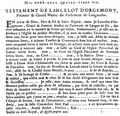


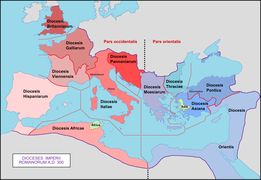
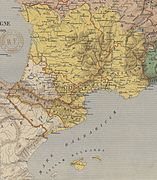
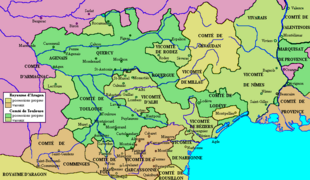


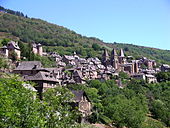
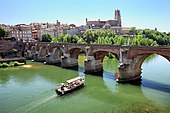
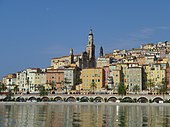

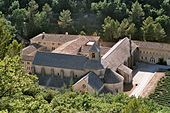

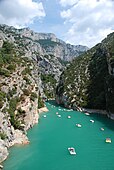
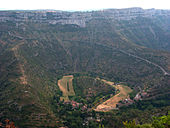



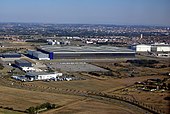
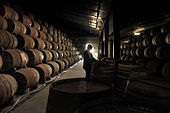
![A surfer at Soorts-Hossegor, considered as one of the best surfing spots in the world.[86]](/media/wikipedia/commons/thumb/a/ab/Hossegor_2008_%283%29.jpg/170px-Hossegor_2008_%283%29.jpg)
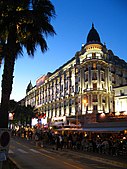
![University of Montpellier's Faculty of Medicine, the oldest and still-active medical school in the world[87]](/media/wikipedia/commons/thumb/d/df/Montpellier_Faculte_medecine.jpg/170px-Montpellier_Faculte_medecine.jpg)
![Pau Golf Club, the oldest golf club in Continental Europe.[88]](/media/wikipedia/commons/thumb/5/55/Pau_Golf_Club_3.jpg/170px-Pau_Golf_Club_3.jpg)